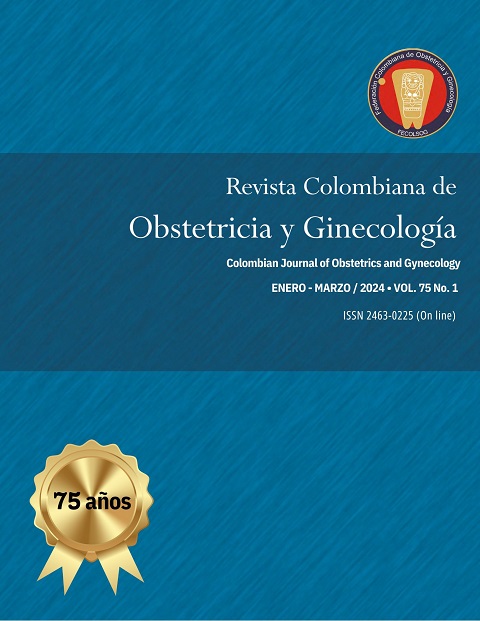Expert consensus: Profiling and management of advanced or metastatic epithelial ovarian cancer
DOI:
https://doi.org/10.18597/rcog.4094Abstract
Introduction and objective: The approach to patients with advanced or metastatic high-grade epithelial ovarian cancer (EOC) has evolved over time with the advent of new therapies and multimodal strategies. The objective of this consensus of experts is to generate national recommendations for the profiling and management of advanced or metastatic high-grade OEC, defined as stages III and IV of the “The International Federation of Gynecology and Obstetrics (FIGO) classification at the time of diagnosis to base on the literature review that included international evidence-based clinical practice guidelines (CPG).
Material and methods: Eleven panelists (oncologists and gynecological oncologists) answered 8 questions about the profiling and management of advanced or metastatic ovarian epithelial carcinoma. The panelists were chosen for their academic profile and
influence in national health institutions. Guidelines from the “ESMO Standardized Operating Procedures Consensus Conference” were used to develop the consensus. It was agreed that the level of agreement to accept a recommendation should be ≥ 80%. The document was peer reviewed.
Results: Eight general recommendations are made, which are presented into five domains. Some of these recommendations are subdivided into specific recommendations.
Initial treatment
Recommendation 1.1 Complete primary cytoreduction (PCS) surgery is suggested as the initial therapy of choice for patients with high-grade or metastatic EOC, which should ideally be carried out in centers with experience, followed by adjuvant therapy.
1.2 Neoadjuvant chemotherapy followed by interval cytoreduction surgery (ICS) is suggested in those who are unlikely to achieve a complete cytoreduction in PCS either due to unresectable metastatic disease or who present unresectability criteria (imaging, laparoscopic and/or by laparotomy) and that have been defined by a gynecological oncologist and patients with poor functional status and comorbidities according to the criteria of the multidisciplinary team (clinical oncology, gynecological oncology, radiology, etc.).
Recommendation 2. In patients with high-grade epithelial ovarian cancer (EOC), in stage III locally advanced or metastatic, who received neoadjuvant chemotherapy and achieved a complete or partial response (cytoreduction with tumor residue < 2.5 mm), the use of Hyperthermic IntraPeritoneal Chemotherapy (HIPEC) could be considered as an alternative to standard platinum-based adjuvant intravenous chemotherapy during interval cytoreductive surgery, after discussion in a multidisciplinary tumor board, at a center experienced in treating this type of patients.
Use of genetic testing.
Recommendation 3. It is suggested at the time of diagnosis to offer molecular genetic testing to all patients with high-grade advanced or metastatic EOC regardless of family history.
Recommendation 4. It is suggested to offer genetic counseling, by qualified personnel, to all patients with high-grade advanced or metastatic EOC who are ordered genetic testing.
Recommendation 5. It is suggested that all patients with advanced or metastatic high-grade EOC undergo a germ panel that includes the Breast Cancer Susceptibility Genes 1/2 genes (BRCA 1/2) and the other susceptibility genes according to with institutional protocols and the availability of genetic testing panels; If it is negative, then somatic testing should be performed that includes the homologous recombination deficiency (HRD) status, regardless of family history.
Adjuvant Therapy
Recommendation 6. 6.1. It is suggested that all patients with advanced stage III/IV EOC, with PSC of (0-2), got adjuvant intravenous chemotherapy as standard treatment within six weeks after Prc. It is suggested paclitaxel/carboplatin.
Recommendation 6.2. It is suggested to use standard chemotherapy base on platinum plus Bevacizumab as adjuvant chemotherapy to patients with high-risk disease (EOC stage IV or stage III with suboptimal tumor cytoreduction), following by bevacizumab as maintenance. The use of bevacizumab as maintenance therapy is not recommended if bevacizumab was not included in the first line of treatment. We suggested the dose used in GOG-0218 and ICON7 trials.
Recommendation 6.3 It is suggested combined intravenous/intraperitoneal chemotherapy only for selected patients, with optimal cytoreduction (residual lesions < 1 cm), especially those without residual disease (R0) and who are evaluated in a multidisciplinary meeting. It is not considered standard treatment.
Recommendation 6.4. 6.4.1 It is suggested to use Poly ADP ribose polymerase (PARP) inhibitors such as olaparib or niraparib as maintenance after receiving first-line chemotherapy in patients with stage III/IV BRCA1/2 positive EOC who received platinumbased chemotherapy and obtained complete response/partial response (CR/PR), 6.4.2 It is suggested to use olaparib alone or in combination with bevacizumab or niraparib in patients with stage III/IV BRCA1/2 positive EOC who received platinum-based chemotherapy plus bevacizumab and achieved CR/PR.
6.4.3 It is suggested to use niraparibin patients with stage III/IV BRCA1/2 negative or unknown EOC who received platinum-based chemotherapy and achieved CR/PR.
6.4.4 It is suggested to use bevacizumab or olaparib plus bevacizumab in patients with EOC stage III/IV BRCA1/2 negative or unknown (HRD positive) who received platinum-based chemotherapy plus bevacizumab and obtained CR/PR.
Treatment of disease relapse
Recommendation 7. Secondary cytoreductive surgery followed by chemotherapy is suggested for selected patients with high-grade advanced EOC in first relapse, platinum-sensitive (platinum-free interval ≥ 6 months), positive “Arbeitsgemeinschaft
Gynäkologische Onkologie – AGO” score or “I-model” positive (< 4.7) with a potential resection to R0 in centers with access to optimal surgical and postoperative support.
Note: Platinum-free interval and AGO score have only been developed as positive predictors of complete resection and not to exclude patients from surgery.
Recommendation 8. 8.1 For patients with relapse advanced high-grade EOC platinum-sensitive, the following is suggested:
- Platinum-based combination chemotherapy: carboplatin/liposomal doxorubicin or carboplatin/paclitaxel or carboplatin/nab-paclitaxel or carboplatin/docetaxel or carboplatin/gemcitabine) for six cycles. If combination therapy is not tolerated, give carboplatin or cisplatin alone.
- Combination chemotherapy (carboplatin/gemcitabine or carboplatin/paclitaxel or carboplatin/doxorubicin liposomal) plus bevacizumab followed by bevacizumab as maintenance (until progression or toxicity).
Recommendation 8.2 For patients with relapsed advanced high-grade EOC platinum-resistant, it is suggested:
- Sequential treatment with chemotherapy, preferably with a non-platinum single agent (weekly paclitaxel or pegylated liposomal doxorubicin or docetaxel or oral etoposide or gemcitabine or trabectidine or, topotecan).
Weekly paclitaxel or pegylated liposomal doxorubicin or topotecan could be administrate with or without bevacizumab.
- Other agents are considered potentially active (capecitabine, cyclophosphamide, ifosfamide, irinotecan, oxaliplatin, pemetrexed, vinorelbine, cyclophosphamide) could be recommended for later lines.
- Hormone receptor-positive patients who do not tolerate or have no response to cytotoxic regimens may receive hormone therapy with tamoxifen or other agents, including aromatase inhibitors (anastrozole and letrozole) or leuprolide acetate,
or megestrol acetate.
- Patients with a performance score ≥ 3 should be considered only for best supportive care.
Recommendation 8.3 Maintenance therapy with PARP inhibitors: It is suggested in patients with relapse advanced high-grade EOC stage III/IV BRCA1/2 (positive, negative or unknown) who have received two or more lines of platinum-based chemotherapy and have achieved CR/PR, use olaparib, niraparib or rucaparib. Niraparib could be useful in BRCA 1/2 +/-/unknown patients, as rucaparib, however, the latter does not yet have approval from the regulatory office in Colombia.
Conclusions: It is expected that the recommendations issued in this consensus will contribute to improving clinical care, oncological impact, and quality of life of these women.
References
The Global Cancer Observatory. GLOBOCAN 2022: International Agency Research on Cancer [Internet]. Disponible en: https://gco.iarc.fr/today/online-analysis-table?v=2020&mode=cancer&mode_population=continents&population=900&populations=170&key=asr&sex=2&cancer=39&type=1&statistic=5&prevalence=0&population_group=0&ages_group%5B%5D=0&ages_group%5B%5D=17&group_cancer=1&i
American Cancer Society. What is ovarian cancer? - About ovarian cancer [Internet]. Cancer.Org.; 2018. p. 1-15. Disponible en: https://www.cancer.org/cancer/ovarian-cancer/about/key-statistics.html
Chen J, Bae E, Zhang L, Hughes K, Parmigiani G, Braun D, et al. Penetrance of breast and ovarian cancer in women who carry a BRCA1/2 mutation and do not use risk-reducing salpingo-oophorectomy: An updated meta-analysis. JNCI Cancer Spectr. 2020;4(4). https://doi.org/10.1093/jncics/pkaa029
Catenacci D, Amico A, Nielsen S, Geynisman D, Rambo B, Carey G, et al. Tumor genome analysis includes germline genome: Are we ready for surprises? Int J Cancer. 2015;136(7):1559-67. https://doi.org/10.1002/ijc.29128
Wright A, Bohlke K, Armstrong D, Bookman M, Cliby W, Coleman R, et al. Neoadjuvant chemotherapy for newly diagnosed, advanced ovarian cancer: Society of Gynecologic Oncology and American Society of Clinical Oncology Clinical Practice Guideline. Gynecol Oncol. 2016;143(1):3-15. https://doi.org/10.1016/j.ygyno.2016.05.022
Coleridge S, Bryant A, Kehoe S, Morrison J. Neoadjuvant chemotherapy before surgery versus surgery followed by chemotherapy for initial treatment in advanced ovarian epithelial cancer. Cochrane Database Syst Rev. 2021;2021(7). https://doi.org/10.1002/14651858.CD005343.pub6
Kehoe S, Hook J, Nankivell M, Jayson G, Kitchener H, Lopes T, et al. Primary chemotherapy versus primary surgery for newly diagnosed advanced ovarian cancer (CHORUS): An open-label, randomised, controlled, non-inferiority trial. Lancet. 2015;386(9990):249-57. https://doi.org/10.1016/S0140-6736(14)62223-6
National Comprehensive Cancer Network. Ovarian cancer (version 1.2023) [Internet]. Disponible en: https://www.nccn.org/login
Al Rawahi T, Lopes A, Bristow R, Bryant A, Elattar A, Chattopadhyay S, et al. Surgical cytoreduction for recurrent epithelial ovarian cancer. Cochrane Database Syst Rev. 2013;2013(2). https://doi.org/10.1002/14651858.CD008765.pub2
Fagotti A, Ferrandina M, Vizzielli G, Pasciuto T, Fanfani F, Gallotta V, et al. Randomized trial of primary debulking surgery versus neoadjuvant chemotherapy for advanced epithelial ovarian cancer (SCORPION-NCT01461850). Int J Gynecol Cancer. 2020;30(11):1657-64. https://doi.org/10.1136/ijgc-2020-001640
Mishra M, Singh N, Ghatage P. Past, present, and future of Hyperthermic Intraperitoneal Chemotherapy (HIPEC) in ovarian cancer. Cureus. 2021;13(6). https://doi.org/10.7759/cureus.15563
Guyatt G, Oxman A, Akl E, Kunz R, Vist G, Brozek J, et al. GRADE guidelines: 1. Introduction—GRADE evidence profiles and summary of findings tables. J Clin Epidemiol. 2011;64(4):383-94. https://doi.org/10.1016/j.jclinepi.2010.04.026
Guyatt G, Oxman A, Vist G, Kunz R, Falck-Ytter Y, Alonso-Coello P, et al. GRADE: An emerging consensus on rating quality of evidence and strength of recommendations. Chinese J Evidence-Based Med. 2008;9(1):8-11. https://doi.org/10.1136/bmj.39489.470347.AD
Healthcare Improvement Scotland. SIGN GRADING SYSTEM 1999-2012 [Internet]. Disponible en: https://www.sign.ac.uk/assets/sign_grading_system_1999_2012.pdf
Querleu D, Planchamp F, Chiva L, Fotopoulou C, Barton D, Cibula D, et al. European Society of Gynaecological Oncology (ESGO) guidelines for ovarian cancer surgery. Int J Gynecol Cancer. 2017;27(7):1534-42. https://doi.org/10.1097/IGC.0000000000001041
Vergote I, Tropé C, Amant F, Kristensen G, Ehlen T, Johnson N, et al. Neoadjuvant chemotherapy or primary surgery in stage IIIC or IV ovarian cancer. N Engl J Med. 2010;363(10):943-53. https://doi.org/10.1056/NEJMoa0908806
Colombo N, Sessa C, Du Bois A, Ledermann J, McCluggage W, McNeish I, et al. ESMO-ESGO consensus conference recommendations on ovarian cancer: Pathology and molecular biology, early and advanced stages, borderline tumours and recurrent disease. Ann Oncol. 2019;30(5):672-705. https://doi.org/10.1093/annonc/mdz062
Redondo A, Guerra E, Manso L, Martin-Lorente C, Martinez-Garcia J, Perez-Fidalgo J, et al. SEOM clinical guideline in ovarian cancer (2020). Clin Transl Oncol. 2021;23(5):961-8. https://doi.org/10.1007/s12094-020-02545-x
Tokunaga H, Mikami M, Nagase S, Kobayashi Y, Tabata T, Kaneuchi M, et al. The 2020 Japan Society of Gynecologic Oncology Guidelines for the treatment of ovarian cancer, fallopian tube cancer, and primary peritoneal cancer. J Gynecol Oncol. 2021;32(2):1-20. https://doi.org/10.3802/jgo.2021.32.e49
Reuss A, Du Bois A, Harter P, Fotopoulou C, Sehouli J, Aletti G, et al. TRUST: Trial of radical upfront surgical therapy in advanced ovarian cancer (ENGOT ov33/AGO-OVAR OP7). Int J Gynecol Cancer. 2019;29(8):1327-31. https://doi.org/10.1136/ijgc-2019-000682
Wang Y, Ren F, Chen P, Liu S, Song Z, Ma X. Effects of CytoReductive surgery plus hyperthermic IntraPEritoneal chemotherapy (HIPEC) versus CytoReductive surgery for ovarian cancer patients: A systematic review and meta-analysis. Eur J Surg Oncol. 2019;45(3):301-9. https://doi.org/10.1016/j.ejso.2018.10.528
Zhang G, Zhu Y, Liu C, Chao G, Cui R, Zhang Z. The prognosis impact of hyperthermic intraperitoneal chemotherapy (HIPEC) plus cytoreductive surgery (CRS) in advanced ovarian cancer: The meta-analysis. J Ovarian Res. 2019;12(1):1-9. https://doi.org/10.1186/s13048-019-0509-1
Kim S, Cho J, Lee E, Park S, Park S, Seol A, et al. Selection of patients with ovarian cancer who may show survival benefit from hyperthermic intraperitoneal chemotherapy: A systematic review and meta-analysis. Medicine. 2019;98(50):1-9. https://doi.org/10.1097/MD.0000000000018355
van Driel W, Koole S, Sikorska K, Schagen van Leeuwen J, Schreuder H, Hermans R, et al. Hyperthermic Intraperitoneal Chemotherapy in ovarian cancer. N Engl J Med. 2018;378(3):230-40. https://doi.org/10.1056/NEJMoa1708618
Lim M, Chang S, Park B, Yoo H, Yoo C, Nam B, et al. Survival after Hyperthermic Intraperitoneal Chemotherapy and Primary or Interval Cytoreductive Surgery in ovarian cancer: A randomized clinical trial. JAMA Surg. 2022;157(5):374-83. https://doi.org/10.1001/jamasurg.2022.0143
Vergote I, Harter P, Chiva L. Hyperthermic Intraperitoneal Chemotherapy does not improve survival in advanced ovarian cancer. Cancer. 2019;125(Suppl 4):594-7. https://doi.org/10.1002/cncr.32496
Lavoué V, Huchon C, Akladios C, Alfonsi P, Bakrin N, Ballester M, et al. Part II. Drafted from the short text of the French guidelines entitled “Initial management of patients with epithelial ovarian cancer” developed by Francogyn, CNGOF, SFOG, Gineco-Arcagy and endorsed by INCa. (Systemic and intraperitoneal treatment, elderly). Gynecol Obstet Fertil Senol. 2019;47(2):111-9.
National Comprehensive Cancer Network. Clinical N, Guidelines P, Guidelines N. Genetic / Familial High-Risk Assessment: Breast, Ovarian, and Pancreatic V2.2022. 2022. Disponible en: https://www.nccn.org/professionals/physician_gls/pdf/genetics_bop.pdf
Hampel H, Bennett R, Buchanan A, Pearlman R, Wiesner G. A practice guideline from the American College of Medical Genetics and Genomics and the National Society of Genetic Counselors: Referral indications for cancer predisposition assessment. Genet Med. 2015;17(1):70-87. https://doi.org/10.1038/gim.2014.147
Konstantinopoulos P, Norquist B, Lacchetti C, Armstrong D, Grisham R, Goodfellow P, et al. Germline and somatic tumor testing in epithelial ovarian cancer: ASCO guideline. J Clin Oncol. 2020;38(11):1222-45. https://doi.org/10.1200/JCO.19.02960
Jacobson M, Bernardini M, Sobel M, Kim R, McCuaig J, Allen L. No. 366-Gynaecologic Management of Hereditary Breast and Ovarian Cancer. J Obstet Gynaecol Canada. 2018;40(11):1497-510. https://doi.org/10.1016/j.jogc.2018.05.046
Paluch-Shimon S, Cardoso F, Sessa C, Balmana J, Cardoso M, Gilbert F, et al. Prevention and screening in BRCA mutation carriers and other breast/ovarian hereditary cancer syndromes: ESMO clinical practice guidelines for cancer prevention and screening. Ann Oncol. 2016 (Suppl 5):v103-10. https://doi.org/10.1093/annonc/mdw327
National Institute for Health and Care Excellence. Familial breast cancer: Classification and care of people at risk of familial breast cancer and management of breast cancer and related risks in people with a family history of breast cancer. [Internet]. Clinical Guideline 164. Cardiff (UK); 2013. Disponible en: http://guidance.nice.org.uk/CG164.
Scottish Intercollegiate Guidelines Network. SIGN 135 - Management of epithelial ovarian cancer. 2013 [Internet]. Disponible en: http://www.sign.ac.uk
González-Santiago S, Ramón y Cajal T, Aguirre E, Alés-Martínez J, Andrés R, Balmaña J, et al. SEOM clinical guidelines in hereditary breast and ovarian cancer (2019). Clin Transl Oncol. 2020;22(2):193-200. https://doi.org/10.1007/s12094-019-02262-0
Malhotra H, Kowtal P, Mehra N, Pramank R, Sarin R, Rajkumar T, et al. Genetic counseling, testing, and management of HBOC in India: An expert consensus document from Indian Society of Medical and Pediatric Oncology. JCO Glob Oncol. 2020;6(6):991-1008. https://doi.org/10.1200/JGO.19.00381
Pignata S, Scambia G, Katsaros D, Gallo C, Pujade-Lauraine E, De Placido S, et al. Carboplatin plus paclitaxel once a week versus every 3 weeks in patients with advanced ovarian cancer (MITO-7): A randomised, multicentre, open-label, phase 3 trial. Lancet Oncol. 2014;15(4):396-405. https://doi.org/10.1016/S1470-2045(14)70049-X
SIGN 135. Management of epithelial ovarian cancer. Key to evidence statements and grades of recommendations; 2013.
Vanderpuye V, Clemenceau Jr V, Temin S, Aziz Z, Burke W, Cevallos N, et al. Assessment of adult women with ovarian masses and treatment of epithelial ovarian cancer: ASCO Resource-Stratified Guideline. JCO Glob Oncol. 2021;7(7):1032-66. https://doi.org/10.1200/GO.21.00085
Hirte H, Poon R, Yao X, May T, Ethier J, Petz L, et al. Neoadjuvant and adjuvant systemic therapy for newly diagnosed stage II- IV epithelial ovary, fallopian tube, or primary peritoneal carcinoma: A systematic review. Crit Rev Oncol Hematol. 2021;162:103324. https://doi.org/10.1016/j.critrevonc.2021.103324
Burger R, Brady M, Bookman M, Fleming G, Monk B, Huang H, et al. Incorporation of bevacizumab in the primary treatment of ovarian cancer. N Engl J Med. 2011;365(26):2473-83. https://doi.org/10.1056/NEJMoa1104390
Perren T, Swart A, Pfisterer J, Ledermann J, Pujade-Lauraine E, Kristensen G, et al. A phase 3 trial of bevacizumab in ovarian cancer. N Engl J Med. 2011;365(26):2484-96. https://doi.org/10.1056/NEJMoa1103799
Oza A, Cook A, Pfisterer J, Embleton A, Ledermann J, Pujade-Lauraine E, et al. Standard chemotherapy with or without bevacizumab for women with newly diagnosed ovarian cancer (ICON7): Overall survival results of a phase 3 randomised trial. Lancet Oncol. 2015;16(8):928-36. https://doi.org/10.1016/S1470-2045(15)00086-8
Jaaback K, Johnson N, Lawrie T. Intraperitoneal chemotherapy for the initial management of primary epithelial ovarian cancer. Cochrane Database Syst Rev. 2016;2016(2). https://doi.org/10.1002/14651858.CD005340.pub4
Moore K, Colombo N, Scambia G, Kim B, Oaknin A, Friedlander M, et al. Maintenance Olaparib in patients with newly diagnosed advanced ovarian cancer. N Engl J Med. 2018;379(26):2495-505. https://doi.org/10.1056/NEJMoa1810858
González-Martín A, Pothuri B, Vergote I, DePont Christensen R, Graybill W, Mirza M, et al. Niraparib in patients with newly diagnosed advanced ovarian cancer. N Engl J Med. 2019;381(25):2391-402. https://doi.org/10.1056/NEJMoa1910962
Ray-Coquard I, Pautier P, Pignata S, Pérol D, González-Martín A, Berger R, et al. Olaparib plus Bevacizumab as first-line maintenance in ovarian cancer. N Engl J Med. 2019;381(25):2416-28. https://doi.org/10.1056/NEJMoa1911361
Tew W, Lacchetti C, Ellis A, Maxian K, Banerjee S, Bookman M, et al. PARP Inhibitors in the management of ovarian cancer: ASCO Guideline. J Clin Oncol. 2020;38(30):3468-93. https://doi.org/10.1200/JCO.20.01924
Miller R, Leary A, Scott C, Serra V, Lord C, Bowtell D, et al. ESMO recommendations on predictive biomarker testing for homologous recombination deficiency and PARP inhibitor benefit in ovarian cancer. Ann Oncol. 2020;31(12):1606-22. https://doi.org/10.1016/j.annonc.2020.08.2102
Marchetti C, Fagotti A, Tombolini V, Scambia G, De Felice F. The role of secondary cytoreductive surgery in recurrent ovarian cancer: A systematic review and meta-analysis. Ann Surg Oncol. 2021;28(6):3258-63. https://doi.org/10.1245/s10434-020-09226-7
Coleman R, Spirtos N, Enserro D, Herzog T, Sabbatini P, Armstrong D, et al. Secondary surgical cytoreduction for recurrent ovarian cancer. N Engl J Med. 2019;381(20):1929-39. https://doi.org/10.1056/NEJMoa1902626
Harter P, Sehouli J, Vergote I, Ferron G, Reuss A, Meier W, et al. Randomized trial of cytoreductive surgery for relapsed ovarian cancer. N Engl J Med. 2021;385(23):2123-31. https://doi.org/10.1056/NEJMoa2103294
Du Bois A, Sehouli J, Vergote I, Ferron G, Reuss A, Meier W, et al. Randomized phase III study to evaluate the impact of secondary cytoreductive surgery in recurrent ovarian cancer: Final analysis of AGO DESKTOP III/ENGOT-ov20. J Clin Oncol. 2020;38(Suppl 15):6000. https://doi.org/10.1200/JCO.2020.38.15_suppl.6000
Harter P, Bois A, Hahmann M, Hasenburg A, Burges A, Loibl S, et al. Surgery in recurrent ovarian cancer: The Arbeitsgemeinschaft Gynaekologische Onkologie (AGO) DESKTOP OVAR trial. Ann Surg Oncol. 2006;13(12):1702-10. https://doi.org/10.1245/s10434-006-9058-0
Tian W, Chi D, Sehouli J, Tropé C, Jiang R, Ayhan A, et al. A risk model for secondary cytoreductive surgery in recurrent ovarian cancer: An evidence-based proposal for patient selection. Ann Surg Oncol. 2012;19(2):597-604. https://doi.org/10.1245/s10434-011-1873-2
Francis J, Coakley N, Elit L, Mackay H. Systemic therapy for recurrent epithelial ovarian cancer: A clinical practice guideline. Curr Oncol. 2017;24(6):e540-6. https://doi.org/10.3747/co.24.3824
How to Cite
Downloads
Published
Issue
Section
License
Copyright (c) 2024 Federación Colombiana de Obstetricia y Ginecología (FECOLSOG)

This work is licensed under a Creative Commons Attribution-NonCommercial-NoDerivatives 4.0 International License.
| Article metrics | |
|---|---|
| Abstract views | |
| Galley vies | |
| PDF Views | |
| HTML views | |
| Other views | |
















